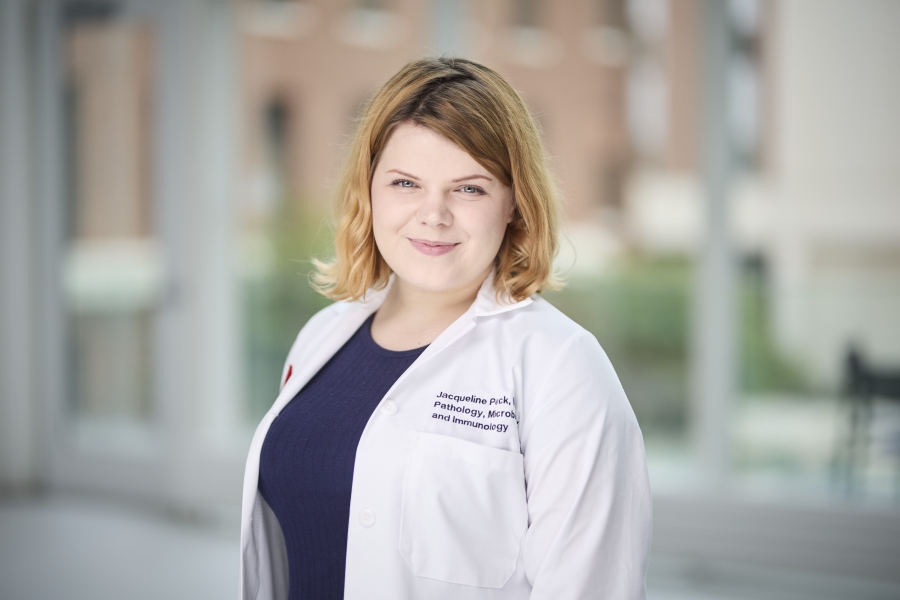A pathology resident in UNMC’s Department of Pathology, Microbiology and Immunology is studying the factors behind increasing antibiotic resistance in a common pathogen.
Haemophilus influenzae can cause sinusitis, ear infections, or pneumonia, as well as invasive infections such as meningitis and bacteremia, said Jacquline Peck, MD, a second-year resident. For non-severe infections, clinicians often use a beta-lactam/beta-lactamase inhibitor combination such as amoxicillin-clavulanate empirically.
“However, recent observations in our laboratory suggest the emergence of H. influenzae isolates resistant to both ampicillin and amoxicillin-clavulanate,” she said. “These findings raise concerns about potential resistance mechanisms, including alterations in penicillin-binding proteins (PBPs) or the production of inhibitor-resistant beta-lactamases.”
“This is a common pathogen ,” she said, “and the resistance to amoxicillin-clavulanate was something we weren’t used to seeing.” Dr. Peck noted that relatively little has been published on this resistance pattern in the U.S., especially at the local level. “We aim to investigate these resistance mechanisms by comparing susceptibility testing methodologies and sequencing isolates to identify mutations in genes encoding PBPs and beta-lactamases.” The goal is to gain insight into the local resistance patterns of H. influenzae and inform treatment strategies.
Dr. Peck’s study is made possible by the department’s Research Grant Awards, created in 2024. The awards provide up to $10,000 in research funding to residents and fellows. The aim of this program is to advance the experience and mentorship in clinical and translational research.
Dr. Peck said they have collected approximately 100 local H. influenzae isolates, including resistant, intermediate, and susceptible strains. Based on preliminary findings, she said about 15% of isolates exhibit resistance to ampicillin and amoxicillin-clavulanate, and about 12% of isolates are intermediate.
The team is now sequencing a subset of the resistant and intermediate isolates, working with Dr. Michael Wiley, Micah Hoylman, Satya Lalam, Dr. Paul Fey, and Dr. Peter Iwen at the Nebraska Public Health Lab.
Dr. Yolande Chan, who serves as Dr. Peck’s research mentor, says the study addresses an important knowledge gap. “There are known limitations to beta-lactamase testing alone for guiding therapy,” Dr. Chan said. “Dr. Peck’s work is helping us evaluate local resistance patterns in more depth and ensure our laboratory methods and interpretations best support clinical decision-making.”
Dr. Peck, an Omaha native, said she has always been drawn to medicine and science. “High school is where I found my love of science, and I always wanted to go to medical school since then.” She earned her medical degree at UNMC last year and was happy to match her residency here. “I’m really happy to be still at UNMC. I had a great experience here during medical school,” she said.
